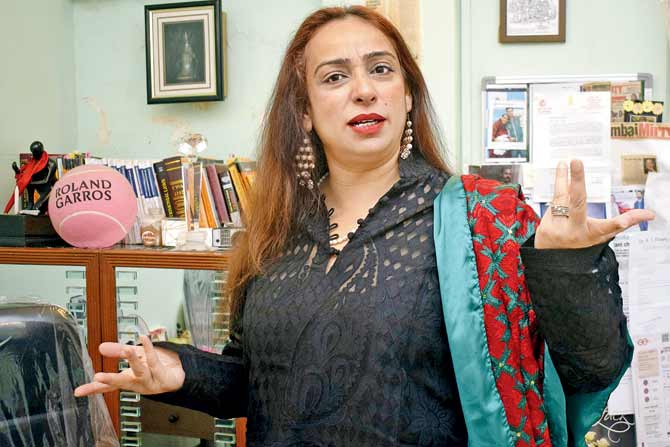Lawyers line up offering pro bono service, say defamation cases being used to intimidate survivors

Jhelum Roy. Pic/Nimesh Dave
Sometime around October this year, 27-year-old Nidhi Khanna, who is in her fifth year of law practice, came across a #MeToo allegation that left her appalled. "A woman tweeted that she was sexually harassed as she was forced to give a blowjob to a man. But, what happened to her was rape," the lawyer who specialises in civil and rights based cases shares. Khanna feels several women calling out their abusers are unaware of the legal parameters and how they can seek redressal.
ADVERTISEMENT
India's MeToo movement gained significant ground on social media in mid-September 2018 after actor Tanushree Dutta spoke up against co-actor Nana Patekar. The unprecedented outpouring of anger and solidarity took many forms, with many women taking to social media to name and shame perpetrators. Taking the cause to its legal end, over 80 lawyers from across the country volunteered on Twitter to provide pro bono legal advice to survivors. Subsequently, a directory in the form of an excel sheet with their contact details was created by Mumbai-based lawyer Rutuja Shinde and shared on multiple social media platforms.

Vandana Shah. Pic/Ashish Raje
Advocate Vandana Shah, a divorce lawyer who also handles cases of social activism, says, "The survivor is already going to face credibility issue, family may or may not support her and there are many out there to shame her for calling out the abuser. So, it felt unfair to stick these women with a legal bill. I allied with the National Commission for Women (NCW) to help handle all sexual harassment cases free of cost." After all, lawyer expenses can be high. Khanna says each session with a lawyer dealing with such cases usually comes up to Rs 7,000 to Rs 15,000, depending on the complexities of the incident.
Fighting defamation
On October 15, former Union Minister of State for External Affairs, M J Akbar, filed a private defamation suit against journalist Priya Ramani, who had outed him as a sexual harasser. But, if this case made it to the headlines, there are many that haven't.
Twenty-eight-year-old Jhelum Roy, from Mumbai, who has in the past handled domestic violence and sexual harassment cases while working for an NGO, says one woman who approached her for legal counsel had received a defamation suit worth lakhs from her abuser, asking her to retract the statement and issue a public apology. Like Roy, Khanna too was contacted by a survivor who had been served with a defamation suit by a celebrity who, she'd accused of harassing her. "She had uploaded two videos of this [the harassment] online. I talked to her and her husband at length. She had already received a defamation notice from one of the abusers and did not know what to do. I suggested that we respond to it, after which usually the abuser's strategy is to lay low. It took me a while to convince her for this. She instead went ahead and posted a third video against the celebrity. But finally we managed to reply to the man's threat as well."

Atharva Dandekar, who specialises in civil and criminal litigation at the Bombay High Court and the sessions court, has had a better experience. Dandekar has received calls from over five young women - all of whom were served with defamation notices from their abusers for calling them out on Twitter. He says, "I told them that this was just a bullying tactic and that it was crucial to respond via a legal letter. This notice usually states that the survivor is going to initiate criminal proceedings against the perpetrator and that she stands by the allegations made by her on social media. I even accompanied some of them to police stations and the proceedings are underway."
Can it sustain?
Yet, the pro bono model may not be self-sustainable. Dandekar, 31, says, "Lawyers are spending their time and effort in this. After a point, not many will be able to offer free legal advice to survivors. In such a case, common people and the government need to create a fund for the legal prosecution of such survivors. They deserve good legal representation."
Mumbai-based One Future Collective offers what might be a more sustainable model. Its founder, Vandita Morarka, last month posted on Twitter, offering a pay-as-you-can service for survivors looking for both legal and mental health counselling. The non-profit that aims at building youth social leadership through art, education, intervention and advocacy, has since been approached by nearly 30 persons.
From Twitter to police station
Yet, the conversion rate from online complaints to FIRs is low. During the five-day-long Diwali festival, Shah juggled multiple calls from survivors of sexual harassment as all courts remained shut. But all refused to file police complaints. Joy and Khanna have similar statistics to report. Shah says while the movement is much-needed to clean up society, it has to reach the legal stage. "The only approach is a legal one or I am afraid the movement will die out slowly."
Catch up on all the latest Mumbai news, crime news, current affairs, and also a complete guide on Mumbai from food to things to do and events across the city here. Also download the new mid-day Android and iOS apps to get latest updates
 Subscribe today by clicking the link and stay updated with the latest news!" Click here!
Subscribe today by clicking the link and stay updated with the latest news!" Click here!






